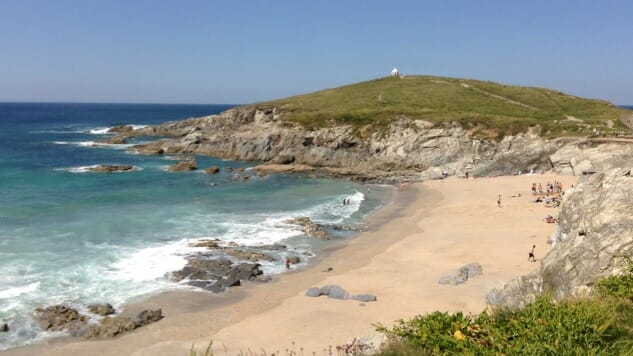Beyond Brexit: How Will the U.K. Election Affect British Communities?
Photo of English coast by Annie Merkley Politics Features UK Election
The Tories have it—the Dec. 12 election in the UK saw a monumental win for the Conservative Party. Boris Johnson, British Prime Minister and the less orange, messier-haired Trump look alike was over the moon about the results. BBC News reported, “that means the Conservatives will have their biggest majority at Westminster since Margaret Thatcher’s 1987 election victory.”
The Tory triumph gives the British Parliament the green light to go through with Brexit full steam ahead.
But what does this Conservative Party landslide victory signify for a place like Cornwall, one of four UK areas that qualified for and have come to rely on poverty-related grants from the EU (European Social Fund)?
Will the environment, tourism, education, and economy be affected by the outcome of this election in one of the UK’s poorest areas?
Cornwall is England’s Southwest protruding peninsula, home of pirate speech, the Legend of King Arthur, stunning windswept coastlines, surprisingly good surf, and the rugged tip to a country that is on the cusp of leaving the European Union. It’s also a place with a strong sense of self-identity, unique culture, and its own language, Cornish—part of the Celtic language family. Although not well known in the USA as a vacation destination, Cornwall is renowned in the UK for its picturesque beaches, mild climate, and as a popular place to go on holiday for families, surfers, partygoers, and outdoor enthusiasts.
I spoke with an environmental scientist at a well-known organization in Cornwall (that has received copious funding from the EU) who weighed in on how the recent election might affect the local environment and tourism.
“Despite occasional rhetoric to the contrary, the Conservative Party does not place the environment high on the agenda. The Conservative MPs for Cornwall have consistently voted against climate mitigation policies and low carbon incentives in recent years. This, despite the fact that Cornwall is one of the leading areas in the country for renewable technology and is undoubtedly reliant on its natural assets and beauty for the lion’s share of it’s revenue today, from tourism…recent Conservative voting has been anti-regulation of fracking and carbon tariffs.”
The environmental scientist continued, “Whilst European regulation was by no means perfect, there was at least a comprehensive set of environmental regulations in place that have seen things like bathing water and drinking water quality improved massively in recent decades, with environmental farming incentives. The Conservative government stands for deregulation of much of these checks and balance systems and the consequences could be devastating for Cornwall.”
“There’s a huge heritage here of extraction, from the marine and the terrestrial environment—in farming, fishing and mining, and today those communities vote for who they think will protect their industries.”
There’s an analogy in the U.S., where many miners and blue-collar workers voted for Trump in 2016, believing that he had their best interests in mind.
As for how the Conservative Party policies apply to education, a teacher with 18 years of experience working in Cornwall with children 11-16 years old, who preferred to remain anonymous, said, “Over the past nine years there have been cuts in education budgets because of austerity…There has also been less money for training and development and less emphasis and funding for creative arts in schools. Cornwall has been very conservative since the last election and there was a rise of UKIP [a right-winged nationalist party] popularity before, which has all gone conservative.”
The teacher expressed that after Brexit, “There won’t be European funding for art and community projects that the EU previously provided. So that could potentially impact on Cornish children who might not be exposed to as much culture as before and with a total reliance on a government who doesn’t value the arts as much as in the past,” saying that especially impoverished youth who don’t get the chance to travel much out of the county would be most affected.
Neil Halstead, critically acclaimed songwriter, guitarist and singer of the beloved band Slowdive, tired of the hustle-bustle of London, moved to Cornwall 20 years ago. Halstead is also an avid surfer and said that the waves played a huge role in his decision to relocate. Newquay, Cornwall, where Halstead resides, is the location for one of the largest pro-surf competitions in Europe and attracts some of the biggest names in the surfing world. He said that Newquay has had a Tory MP for sometime who was just re-elected, so he doubts that the latest election results would create a significant change in the world of Cornish surfing.
However, Halstead also said, “Brexit will have a massive impact here, as the region has long been subsidized by the EU to the tune of 80 million a year…building projects and farming and fishing subsidies…this will not be replaced by UK funds so, it will be sorely missed…though of course Cornwall voted to leave the EU. Oh the irony.”
The environmental scientist, still seeing the silver lining in the laden Cornish clouds noted, “I’m cheered however, by the amazing volunteer environmental movement in county—the legions of people who head out on the beaches in all weathers to clean or to survey, the artisan makers, the regenerative and independent small businesses that are cropping up everywhere. I think that, like me, the majority of people understand the privilege and the benefit of living in such a wild and beautiful place—benefits for health, wellbeing, community etc. and the importance of operating within boundaries to protect Cornwall’s natural environment…even if the majority didn’t vote in the most obvious way!”